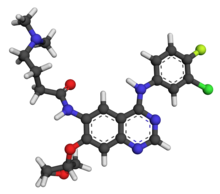
Back أفاتينيب Arabic Afatinib German Afatinib Spanish آفاتینیب Persian Afatinibi Finnish Afatinib French Afatinib Italian アファチニブ Japanese ଆଫାଟିନିବ OR Afatynib Polish
 | |
 | |
| Clinical data | |
|---|---|
| Trade names | Gilotrif, Giotrif, Afanix |
| Other names | BIBW 2992 |
| AHFS/Drugs.com | Monograph |
| MedlinePlus | a613044 |
| License data | |
| Pregnancy category |
|
| Routes of administration | By mouth |
| ATC code | |
| Legal status | |
| Legal status | |
| Pharmacokinetic data | |
| Protein binding | 95% |
| Metabolism | CYP not involved |
| Elimination half-life | 37 hours |
| Excretion | Faeces (85%), urine (4%) |
| Identifiers | |
| |
| CAS Number | |
| PubChem CID | |
| IUPHAR/BPS | |
| DrugBank | |
| ChemSpider | |
| UNII | |
| KEGG | |
| ChEBI | |
| ChEMBL | |
| CompTox Dashboard (EPA) | |
| ECHA InfoCard | 100.239.035 |
| Chemical and physical data | |
| Formula | C24H25ClFN5O3 |
| Molar mass | 485.94 g·mol−1 |
| 3D model (JSmol) | |
| |
| |
| | |
Afatinib, sold under the brand name Gilotrif among others, is a medication which is used to treat non-small cell lung carcinoma (NSCLC).[2][3][4] It belongs to the tyrosine kinase inhibitor family of medications.[5] It is taken by mouth.[5][1]
It is mainly used to treating cases of NSCLC that harbour mutations in the epidermal growth factor receptor (EGFR) gene.[6]
It is on the World Health Organization's List of Essential Medicines.[7]
- ^ a b Cite error: The named reference
Gilotrif FDA labelwas invoked but never defined (see the help page). - ^ Cite error: The named reference
Spreitzerwas invoked but never defined (see the help page). - ^ Cite error: The named reference
Minkovskywas invoked but never defined (see the help page). - ^ Cite error: The named reference
FDAwas invoked but never defined (see the help page). - ^ a b Cite error: The named reference
TGAwas invoked but never defined (see the help page). - ^ Vavalà T (2017). "Role of afatinib in the treatment of advanced lung squamous cell carcinoma". Clinical Pharmacology. 9: 147–157. doi:10.2147/CPAA.S112715. PMC 5709991. PMID 29225480.
- ^ World Health Organization (2021). World Health Organization model list of essential medicines: 22nd list (2021). Geneva: World Health Organization. hdl:10665/345533. WHO/MHP/HPS/EML/2021.02.
© MMXXIII Rich X Search. We shall prevail. All rights reserved. Rich X Search